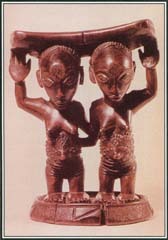Michelle
Thomas
April
30th, 2012
English
495
Globalization in Slumdog Millionaire
Being part of Western culture
often blinds us from the reality of other cultures around the world. Some of our most popular ideals from Western
culture greatly influence other cultures globally. The 2008 Academy Award Winning Best Picture Slumdog Millionaire, directed by Danny
Boyle, follows a young man named Jamal and the controversial experiences he faces
while living in the slums of India.
Jamal is accused of cheating while on a game show, and he is forced to recount
different tragic memories he has experienced throughout his life despite being
deprived of education, parents, and wealth.
The film demonstrates how Jamal progresses as a person through the
experiences he faces, and defines the different factors that contributes to his
personal development. In the film, the
Western influence is very defined, and this is shown through Jamal’s
character. Throughout the film it is
evident that capital fuels India as it rapidly evolves into an industrialized
country, which is an asset to everyone, not excluding Jamal. Through the article “Where did the Future Go”
by Randy Martin, the book A Brief History
of Neoliberalism by David Harvey, and the film Slumdog Millionaire, globalization and its effects are illustrated
along side the devastating effects Neoliberalism has in India.
In Harvey’s book, A Brief History of Neoliberalism, he
states, “while many general accounts of global
transformations and their effects are now available, what is generally
missing––is the political-economic story of where neoliberalization came from
and how it proliferated so comprehensively on the world stage” (4). The world as a whole is changing, molding and
taking influence from many different places.
This ever-changing theme be seen in the film through the globalization
India faces, namely due to the Western cultures’ influence. Globalization affects many different cultures
and thus many different individuals everyday.
Through the ongoing globalization in different countries, many different
opportunities have presented themselves in these countries that otherwise would
not have presented themselves. No matter
how many positive aspects globalizing economies bring to people living there,
there are also bad qualities that come along with it. The rich only get wealthier, while the poor
keep dwindling down, and essentially cuts out a middle class altogether. The neoliberalist effect on the global market
has only helped make more billionaires, and help existing billionaires grow wealthier,
leaving everyone else struggling to survive.
This can be seen globally with the issue of the 99% and the 1%; only 1%
of the world is not struggling to survive, while the other 99% often have nowhere
to turn. Throughout the film, there is a
very distinct difference between how the wealthy live, and the conditions the
poor individuals are seemingly stuck in; the wealthy being the 1% and the poor
being the 99%. The images throughout the
film show the slums and how the people in the slums were forced to live; this
did not affect the wealthier people of the country.
Within the recent years, India has
become rapidly globalized. Examples of
this globalization can be seen in the film through different avenues, such as the
various questions on the game show, the Coke offered to the boys soon after
they lost their mother, and the idolizing of the celebrity when the boys were young. These different examples really exemplify the
ever-changing environment, and with this comes different scenes in the film that
emulate the Western culture in Jamal’s native country of India. One example can be seen when Jamal and his
brother Salim impersonate tour guides at the Taj Mahal to help bring in money
so that they can survive. The boys end
up stealing shoes from tourists and then selling them, promoting the fact that
they are American shoes in hopes to bring in more money. This proves that products that originate from
the Western culture are both desirable and can be seen as a symbol of wealth
and power if one owns them. With this
comes the reasoning behind why the boys are impersonating these people, in
order to obtain capital and help better their chances of survival. In the scene of the film where Jamal is being
beaten in front of American tourists he screams, “You wanted to see the real
India? Here it is!” The tourists respond to this by giving Jamal
money and saying to him, “here’s a bit of the real America, son.” The real India that Jamal refers to indicates
that India is not only a poverty-ridden country, but also a violent one. With the American tourists response of giving
money it could be argued that the United States is a wealthy and capitalist
nation, where most problems can be resolved with money. This is where the line between the poor and
the wealthy widens even more; the wealthy can afford to give away money while
the poor are forced to go to extreme measures to obtain money. This comes back to how neoliberalism affects
the global market. In his book, Harvey
states:
Economic
globalization has entered a new phase. A mounting backlash against its effects,
especially in the industrial democracies, is threatening a disruptive impact on
economic activity and social stability in many countries. The mood in these
democracies is one of helplessness and anxiety, which helps explain the rise of
a new brand of populist politicians. (81).
This scene in the film is describing what Harvey is stating when
he talks about how the stability of these countries being affected by
globalization is at risk. This trickles
down to affect most everyone, including the man beating Jamal. Arguably, the man’s character can be seen as
representing the whole country of India, lashing out against the constant
Western influence, an influence that can be seen in Jamal’s character.
As the film comes
to a close and both Jamal and Salim look at the industrialized land that once
was their home, it becomes obvious that the people with whom they used to share
these living conditions with are no longer present in this area. It is unclear as to what has become of these people;
they have been forgotten and discarded because they failed to keep up with the ever-changing
globalization of India. Everyone who
could not keep up has moved on, an idea for which Martin states, “For those
workers of the world who could secure a seat on the bus, the trip to tomorrow
would take them to a market utopia.”
This idea is one of the saddest realizations of the ever changing
globalizing economy, not everyone who grew up in slums similar to Jamal and
Salim had the chance to use this new “market utopia” to prosper. These people were at a disadvantage when they
were born to poor families, because children that lived in these areas were not
given the proper education that would help them to succeed in these new
businesses that are taking over the slums. Harvey
notes how the trend of the neoliberalism taking place in India has been
commonly perceived that “if conditions among the lower classes deteriorated,
this was because they failed, usually for personal and cultural reasons, to
enhance their own human capital (through dedication to education, the
acquisition of a Protestant work ethic, submission to work discipline and
flexibility, and the like).” So with
the ideals of neoliberalism in mind, the people who could not keep up had no
one to blame but themselves. However,
with no resources available to help better the people in the slums, it is next
to impossible for them to obtain any sort of education or flexibility when it
comes to work. It is unsaid in the film
what has become of these displaced people, but their homes have been destroyed
and transformed to help benefit the owners of these businesses, who do not need
the help the original inhabitants did.
This area that used to be the only place the poor could afford to live
has become a place that they could no longer bear the expense to live in.
No matter which way a person looks,
globalization is unavoidable and is very present and constant in our everyday
lives. The molding earth and
neoliberalism can essentially be summarized by one of the films last scenes, when
Salim and Jamal are reunited and Salim states,
“That used to be our slum. Can you believe that? We used to
live right there. Now, it’s all business. India is at the center of the world
now. And I am at the center of the center.”
This quote shows how globalized India has become, and how humans are
front and center of this change. The
slums as the boys knew it has been transformed and made into these businesses,
in just a matter of a few short years. The
Western influence is present throughout the film, even with the “happily ever
after” ending. Capital is the fuel
behind the fire in India, and a person is expected to either keep up with the
changes or become displaced and forgotten about. With the help of Randy Martin’s article and
David Harvey’s text, the perception of Slumdog
Millionaire has changed from a harsh tale of reality to a critical view of
the world as globalization and neoliberal practices take over.
Works Cited
Harvey, David. A
Brief History of Neoliberalism. Oxford: Oxford University Press,
2005. Print.
Martin, Randy.
“Where Did The Future Go?” Logos 5.1 (2006): n. pag.
Web. 29 April
2012.
Slumdog Millionaire. Dir. Danny Boyle. Fox Searchlight Pictures and
Warner Bros.
Pictures, 2009. DVD.
 |
| A picture of how India's slums are in present time. |
 |
| I could never imagine having to live like this. |

















